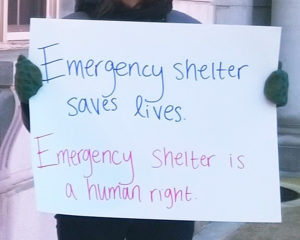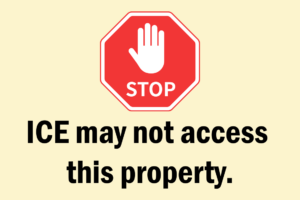1. Dictates that homelessness is treated as a crime and encourages the use of law enforcement and involuntary institutionalization against people living outside.
2. Demands the redirection of funding from life-saving and evidence-based housing and harm-reduction-based solutions
3. Blames individuals, rather than responding to homelessness as a housing and public health crisis.
4. Combined with cuts to SNAP and Medicaid, pushes more people into homelessness and lacks solutions to assist people in exiting homelessness.
5. Raises serious threats to privacy by expanding the collection and sharing of data on marginalized people in our communities
Criminalizing homelessness wastes our tax dollars and disconnects people from the critical services that provide a path out of homelessness, such as jobs, housing, and healthcare. Right now, unhoused people in Washington D.C. — and soon in the rest of our communities — are being pushed further away from this path. Contact your federal, state, and local lawmakers to demand a humane, effective, and affordable housing–centered approach to ending homelessness — one that addresses the root economic challenges affecting all Americans. Read the National Alliance to End Homelessness’s series on this topic.
Preble Street testimony in support of permanent, sustainable funding for Maine emergency shelters
Maine needs and deserves safe, accessible, professionally run, and sustainable emergency shelters that can meet the needs of the growing number of individuals and families experiencing homelessness in our state. On Tuesday, February 10, 2026, shelter executive directors and staff from across the state went to Augusta to advocate for a sustainable funding source that

Take Action: Tell Maine to provide permanent funding for emergency shelters!
Depending on where a person lives in our state, they may need to travel hours to the nearest shelter if they become homeless. There is no guarantee that when they arrive there will be a bed available. Right now, there are not enough shelter beds in Maine for the thousands of individuals and families experiencing

TAKE ACTION to Protect Maine’s Public Schools, Hospitals, Daycares, and Libraries from ICE
Tell your Maine legislators to support LD 2106! Increased presence of Immigration and Customs Enforcement (ICE) agents, as part of the dehumanizingly named ‘Operation Catch of the Day,’ is creating constant fear and anxiety for so many of our neighbors, leaving them scared to leave their homes, go to work, take their children to school, seek
